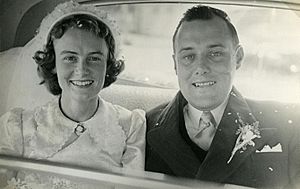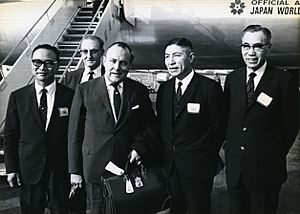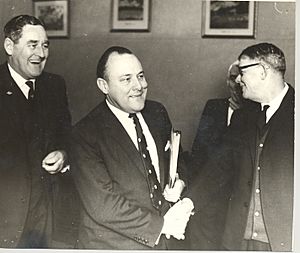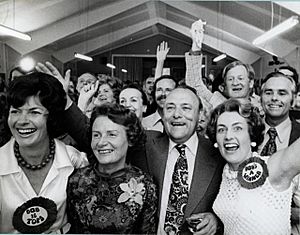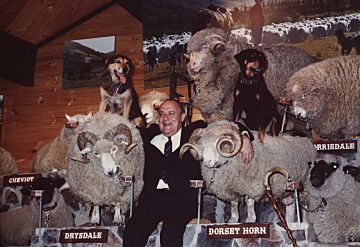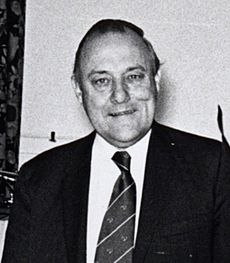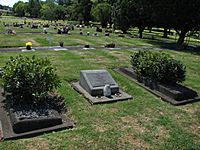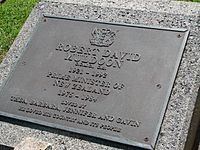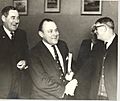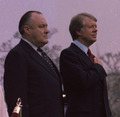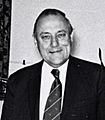Robert Muldoon facts for kids
Quick facts for kids
Sir Robert Muldoon
|
|
|---|---|
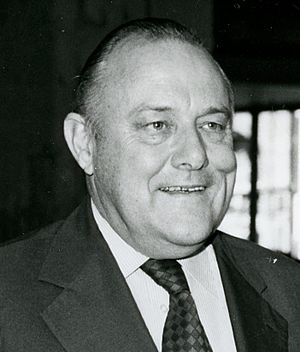
Muldoon in 1978
|
|
| 31st Prime Minister of New Zealand | |
| In office 12 December 1975 – 26 July 1984 |
|
| Monarch | Elizabeth II |
| Governor-General | Denis Blundell Keith Holyoake David Beattie |
| Deputy | Brian Talboys (1975–1981) Duncan MacIntyre (1981–1984) Jim McLay (1984) |
| Preceded by | Bill Rowling |
| Succeeded by | David Lange |
| 32nd Minister of Finance | |
| In office 12 December 1975 – 26 July 1984 |
|
| Prime Minister | Himself |
| Preceded by | Bob Tizard |
| Succeeded by | Roger Douglas |
| In office 4 March 1967 – 8 December 1972 |
|
| Prime Minister | Keith Holyoake Jack Marshall |
| Preceded by | Harry Lake |
| Succeeded by | Bill Rowling |
| 4th Deputy Prime Minister of New Zealand | |
| In office 9 February 1972 – 8 December 1972 |
|
| Prime Minister | Jack Marshall |
| Preceded by | Jack Marshall |
| Succeeded by | Hugh Watt |
| 21st Leader of the Opposition | |
| In office 4 July 1974 – 12 December 1975 |
|
| Prime Minister | Norman Kirk Bill Rowling |
| Deputy | Brian Talboys |
| Preceded by | Jack Marshall |
| Succeeded by | Bill Rowling |
| In office 26 July 1984 – 29 November 1984 |
|
| Prime Minister | David Lange |
| Deputy | Jim McLay |
| Preceded by | David Lange |
| Succeeded by | Jim McLay |
| Member of the New Zealand Parliament for Tamaki |
|
| In office 26 November 1960 – 31 December 1991 |
|
| Preceded by | Bob Tizard |
| Succeeded by | Clem Simich |
| Personal details | |
| Born |
Robert David Muldoon
25 September 1921 Auckland, New Zealand |
| Died | 5 August 1992 (aged 70) Auckland, New Zealand |
| Resting place | Purewa Cemetery, Meadowbank |
| Political party | National |
| Spouse |
Thea Flyger
(m. 1951) |
| Children | 3 |
| Parents | James Henry Muldoon Amie Rusha Browne |
| Profession | Accountant |
| Signature |  |
| Military service | |
| Allegiance | New Zealand |
| Branch/service | New Zealand Military Forces |
| Years of service | 1940–1946 |
| Rank | Sergeant |
| Unit | 37th Battalion Divisional Cavalry Regiment |
| Battles/wars | World War II |
Sir Robert David Muldoon (25 September 1921 – 5 August 1992) was a New Zealand politician. He served as the 31st prime minister of New Zealand from 1975 to 1984. He was also the leader of the National Party during this time.
Muldoon served in the army during World War II. After the war, he became an accountant. He was the first fully qualified cost accountant in New Zealand. In 1960, he was elected to Parliament as the Member for Tamaki. He was part of the National Party. Muldoon held several important roles, including Minister of Tourism (1967), Minister of Finance (1967–1972), and Deputy Prime Minister (1972). He gained strong support from many people, especially in rural areas. This group was sometimes called "Rob's Mob."
In 1972, the Labour Party won the election, and National lost power. Muldoon then became Leader of the Opposition in 1974. He promised a good retirement plan for older people. He also used a style of politics called "counterpunching." This meant he would strongly challenge his opponents. The Labour Party leader, Norman Kirk, passed away suddenly. This weakened the Labour Party. Muldoon then led the National Party to a big win in the 1975 election.
As Prime Minister, Muldoon said he would lead "a Government of the ordinary bloke." He also made himself Minister of Finance. His time as leader faced many economic problems. These included slow growth, high inflation, and rising unemployment. His government introduced a national superannuation scheme. They also froze wages and prices. They started large industrial projects called "Think Big." Muldoon continued a policy called the Dawn Raids. These raids targeted people from Pacific Island nations who had overstayed their visas. In foreign policy, Muldoon was against the Soviet Union. He also strengthened New Zealand's defence ties with the United States and Australia.
In 1981, a rugby tour by the Springboks (South Africa's team) caused major protests. Muldoon refused to stop the tour, which divided the country. He won two more elections in 1978 and 1981. However, his party lost the overall popular vote in these elections. In 1984, Muldoon called a snap election. His party lost badly to the Labour Party. Before leaving office, he had to devalue the New Zealand dollar. This happened during a constitutional crisis. In 1984, he was knighted while still in office. He passed away in 1992.
Muldoon had a strong and sometimes controversial public image. He was known for being direct and not always formal. He was willing to make tough decisions. Some people see him as a very important leader of his time. He is also remembered for breaking social norms and challenging others.
Contents
Early Life and Family Background
Robert David Muldoon was born in Auckland, New Zealand, on 25 September 1921. His parents were James Henry Muldoon and Amie Rusha Muldoon. His father's family had Irish roots. When he was five, 'Rob' Muldoon hurt his cheek while playing. This left him with a noticeable scar.
When Robert was eight, his father became ill. This meant his mother raised him on her own. During this time, his grandmother, Jerusha, greatly influenced him. She was very smart and strong-willed. She believed in socialism, but Muldoon did not follow her political beliefs. However, she helped him develop a strong desire to succeed. She also sparked his interest in politics and respect for New Zealand's welfare state.
Muldoon earned a scholarship to attend Mount Albert Grammar School. He studied there from 1933 to 1936. He left school at age 15. He then worked at Fletcher Construction and later at the Auckland Electric Power Board. He studied accountancy by mail.
In 1951, Muldoon married Thea Dale Flyger. They had met through the Junior Nationals, a youth political group. They had three children: Barbara, Jennifer, and Gavin. Lady Muldoon passed away in 2015 at age 87. She received honours for her public service.
Early Political Career
Muldoon joined the New Zealand Military Forces in November 1940 during World War II. He served in the South Pacific with the 37th Battalion. Later, he was sent to Italy. He served with the Divisional Cavalry Regiment. He completed his accounting training while in Italy. He became an accountant after the war. He was New Zealand's first fully qualified cost accountant.
Becoming a Member of Parliament
| New Zealand Parliament | ||||
| Years | Term | Electorate | Party | |
| 1960–1963 | 33rd | Tamaki | National | |
| 1963–1966 | 34th | Tamaki | National | |
| 1966–1969 | 35th | Tamaki | National | |
| 1969–1972 | 36th | Tamaki | National | |
| 1972–1975 | 37th | Tamaki | National | |
| 1975–1978 | 38th | Tamaki | National | |
| 1978–1981 | 39th | Tamaki | National | |
| 1981–1984 | 40th | Tamaki | National | |
| 1984–1987 | 41st | Tamaki | National | |
| 1987–1990 | 42nd | Tamaki | National | |
| 1990–1991 | 43rd | Tamaki | National | |
In March 1947, Muldoon joined the Junior Nationals. This was the youth group of the New Zealand National Party. He quickly became active in politics. He ran for Parliament twice before winning. In 1960, he was elected as the MP for Tamaki. He won against Bob Tizard. This election brought Keith Holyoake back as Prime Minister. Muldoon represented Tamaki for 32 years.
Muldoon, along with other new MPs, was called the "Young Turks." This nickname was for young rebels who questioned older leaders. Muldoon also got the nickname "Piggy." He seemed to enjoy his strong public image. He was very good at debating and worked hard in Parliament.
Joining the Cabinet
After the 1963 election, Muldoon became Under-Secretary to the Minister of Finance. In this role, he helped introduce decimal currency to New Zealand. This meant changing from pounds, shillings, and pence to dollars and cents. There were some early issues with the new coins and notes. But these were sorted out before the currency was launched in July 1967.
Becoming Minister of Finance
In 1967, Muldoon was appointed Minister of Tourism and Associate Minister of Finance. A few months later, the Minister of Finance, Harry Lake, passed away. Prime Minister Keith Holyoake then appointed Muldoon as Minister of Finance. Muldoon was 45, making him one of the youngest Finance Ministers.
At the time, New Zealand faced a serious economic crisis. The price of wool, a key export, had fallen. Muldoon responded by introducing "mini-budgets." These were smaller budgets instead of one big annual one. He cut government spending and increased taxes on some goods. This helped the economy improve. Muldoon became well-known to the public for these actions. He was also good at using television, which was a new medium then.
Deputy Prime Minister
In 1972, Prime Minister Holyoake stepped down. Muldoon tried to become the new leader but lost to Jack Marshall. However, Muldoon was chosen as the deputy leader. This made him Deputy Prime Minister.
Marshall's party lost the 1972 election to the Labour Party. Norman Kirk, a popular leader, became Prime Minister. This ended 12 years of National Party rule.
Leader of the Opposition
Many in the National Party felt Marshall was not strong enough to challenge Norman Kirk. So, Marshall resigned, and Muldoon became Leader of the Opposition on 9 July 1974. His first book, The Rise and Fall of a Young Turk, was published the next day. It sold many copies.
Muldoon was very good at using television. He also held large public meetings with his supporters, known as "Rob's Mob." These supporters included many working-class people who held conservative views.
Muldoon was ready to challenge Kirk. But Kirk passed away suddenly on 31 August 1974. Bill Rowling became the new Labour Prime Minister. In the 1975 election, National's slogan was "New Zealand – The Way You Want It." Muldoon created this slogan himself. He promised a generous national retirement plan. He also promised to fix New Zealand's economy. Labour's campaign was called "Citizens for Rowling." Muldoon won a big victory, and National returned to power.
Prime Minister of New Zealand
First Term: 1975–1978
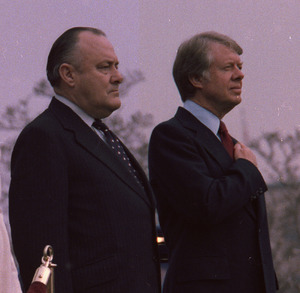
Muldoon became New Zealand's 31st Prime Minister on 12 December 1975. He was 54 years old. He promised to lead a government for "the ordinary bloke." His government immediately faced economic problems. New Zealand's economy shrank, and unemployment rose.
National Superannuation Scheme
One of Muldoon's first actions was about the previous government's retirement plan. He announced he would stop it without new laws. He planned to make this legal later. However, the Chief Justice, Sir Richard Wild, said Muldoon's actions were illegal. Only Parliament could change laws. This event showed that the Prime Minister could not act alone.
Muldoon's own National superannuation scheme was a promise from his 1975 election campaign. It was a very generous plan for older people. However, it was very expensive for the government. By 1981, the cost of this scheme had doubled. It took up a large part of the government's budget. This meant less money for other areas, like education.
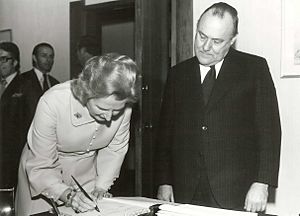
Economic Challenges and Policies
Muldoon's government faced many economic problems. These included a drop in wool prices and Britain joining the European Economic Community. The 1973 oil crisis also hurt New Zealand's economy. Muldoon tried to protect New Zealand's welfare state. He wanted to keep the system that supported people "from cradle to grave." He also made himself Minister of Finance. This gave him a lot of power.
In his first term, Muldoon tried to cut spending. But the cost of his superannuation scheme grew. By 1978, the economy was growing again. But unemployment and inflation were still high.
The Dawn Raids
Robert Muldoon continued a policy started by the previous government. This policy involved arresting and deporting people from Pacific Island nations who had overstayed their visas. Since the 1950s, many people from Samoa, Tonga, and Fiji had moved to New Zealand. They came to help with a shortage of workers. By the early 1970s, many had overstayed their visas.
The economic problems of the 1970s led to concerns about jobs and housing. Muldoon's government increased police raids on the homes of overstayers. These were called "dawn raids" because they happened early in the morning. People found to have overstayed were usually sent back to their home countries.
These raids caused a lot of debate in New Zealand. Many groups, including Pacific Islanders, Māori, and church groups, spoke out against them. They pointed out that Pacific Islanders were a small part of all overstayers. But they made up most of those arrested. The raids also affected New Zealand's relationships with Pacific Island countries. By 1979, the government stopped the Dawn Raids. They realized the raids were not solving the economic problems.
Appointment of Sir Keith Holyoake
As Prime Minister, Muldoon advised Queen Elizabeth II on who should be the next Governor-General. In 1977, he suggested former Prime Minister Sir Keith Holyoake. The Queen approved this choice. The announcement was made during the Queen's visit to New Zealand.
This decision was debated because Holyoake was still a Cabinet minister. Some people felt it was a political appointment. The opposition leader, Bill Rowling, said he was not consulted. He also said he would try to remove Holyoake if Labour won the next election. Holyoake resigned from Parliament after his appointment.
1978 General Election
Before the 1978 election, Muldoon was still the preferred Prime Minister. But his support had dropped. In the election on 25 November, National lost three seats. Their share of the vote also went down. Although National won enough seats to stay in power, they received fewer votes than the Labour Party.
Second Term: 1978–1981
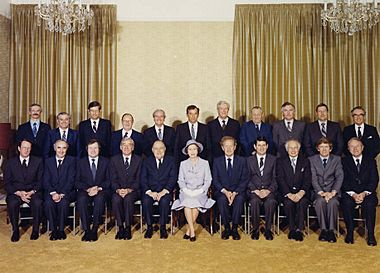
Taxation Changes
Muldoon had been against taxes on goods and services. He thought they would hurt poorer people and increase prices. But in May 1979, he introduced new taxes. These were 10% to 20% taxes on many items. These included petrol, lawnmowers, caravans, and boats. Critics said these taxes were unfair and not effective. The taxes on boats and caravans especially hurt those industries. This led to more unemployment.
Views on Communism
Muldoon was strongly against Communism. He saw it as a foreign idea. He believed Communist groups tried to cause problems in New Zealand. He accused them of starting strikes and protests. He also thought the Soviet Union was an aggressive power.
Muldoon joined other Western leaders in condemning the Soviet invasion of Afghanistan in 1979. He supported boycotting the 1980 Summer Olympics. However, his government did not stop trading with the Soviet Union. This was because it would hurt New Zealand's farming exports. In 1980, New Zealand also expelled the Soviet Ambassador.
Arthur Allan Thomas Case
Muldoon became aware of the case of Arthur Allan Thomas. Thomas had been convicted twice for murder. Muldoon asked a lawyer to review the case. The lawyer said an "injustice may have been done." Muldoon then granted Thomas a royal pardon. A later inquiry found Thomas innocent. He was paid compensation for the time he spent in prison.
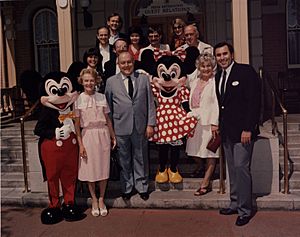
East Coast Bays By-election
Muldoon appointed Frank Gill as New Zealand's ambassador to the United States. This led to a special election in Gill's old seat, East Coast Bays. Muldoon wanted Sue Wood to win. But the National Party chose Don Brash as their candidate. Brash lost the election to Gary Knapp from the Social Credit party. This was a big surprise and a blow to Muldoon's leadership. Muldoon blamed Brash and the party. But the party strongly disagreed with him. This loss led to more opposition against Muldoon within the National Party.
The Colonels' Coup
After the East Coast Bays by-election, some National Party members tried to remove Muldoon as leader. This attempt in late 1980 was called the "Colonels' Coup." It was led by Jim Bolger, Jim McLay, and Derek Quigley. They wanted to replace Muldoon with his deputy, Brian Talboys. Muldoon was overseas at the time. He easily stopped the plot. Talboys himself was not keen on taking over. After this, Muldoon faced no other serious challenges to his leadership until after the 1984 election.
The Springbok Rugby Tour
In 1981, the Springboks, South Africa's national rugby team, planned a tour of New Zealand. South Africa had a system called apartheid, which was unfair to non-white people. Many people wanted Muldoon to stop the tour. But Muldoon believed that politics should not interfere with sport. He argued that allowing the tour did not mean supporting apartheid. He also said that New Zealand had agreed to let sportspeople decide for themselves.
"The Tour" caused huge public protests and divided New Zealand. Muldoon firmly supported allowing the tour. He said it was about individual freedom. He also argued that playing a South African team was no different from playing a Soviet Union team.
Think Big Projects
The second oil crisis of 1979 hit New Zealand's economy. Muldoon tried to control rising wages and inflation. He offered tax cuts if unions agreed not to ask for more pay. But the union leader, Jim Knox, refused. In response, Muldoon started his "Think Big" strategy.
Under Think Big, the government borrowed a lot of money. They invested in large industrial projects, mostly related to energy. The goal was to make New Zealand more than 60% self-sufficient in energy. It also aimed to create many jobs. For example, the Clyde Dam was built to make electricity for aluminum production. This was part of Muldoon's plan to protect New Zealand from global problems.
The Think Big projects became a major part of Muldoon's legacy. However, their costs often went far over budget. This worsened New Zealand's debt and inflation. The projects relied on imported equipment. This also hurt the economy. The projects are still debated today.
Muldoon also supported converting cars to run on natural gas. This was to save on foreign oil. New Zealand became the first country where dual-fuel cars were common.
1981 General Election
Despite the protests over the Springbok Tour, Muldoon's government won the 1981 election. National won 46 seats, Labour 44, and Social Credit 2. A recount gave National one more seat, giving them a majority of one. Muldoon was convinced not to make the Springbok Tour an election issue. Instead, National's campaign focused on Think Big. Again, Muldoon's government received fewer votes than the Labour Party.
Third Term: 1981–1984
Muldoon's third term was difficult. With only a one-seat majority, he faced challenges from within his own party. Some National MPs wanted more free-market economic policies. In 1982, Derek Quigley, a junior minister, spoke out against Think Big. Muldoon asked him to apologize or resign. Quigley chose to resign.
Muldoon also had a disagreement with businessman Bob Jones. Jones then started his own party, the New Zealand Party. This party took many votes from National in the 1984 election.
Economic Recession and Wage Freeze
A second recession hit New Zealand in September 1982. The economy shrank again, and unemployment rose. Muldoon then imposed a freeze on wages and most prices in April 1982. This was meant to last for a year but stayed for nearly two years. It was ended by the new Labour Government. Years later, Muldoon admitted the freeze was a political mistake.
Falklands War Support
In 1982, Muldoon's government supported Britain in the Falklands War. New Zealand did not directly fight. But Muldoon sent two frigates, HMNZS Canterbury and HMNZS Waikato, to the Indian Ocean. This allowed British ships to go to the conflict. New Zealand also ended its diplomatic ties with Argentina.
Closer Economic Relations (CER)
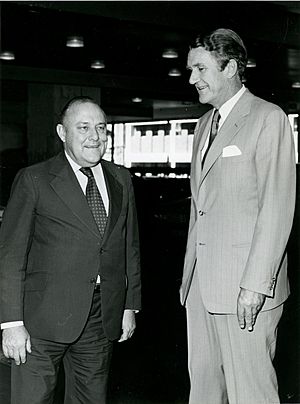
Muldoon started the Closer Economic Relations (CER) agreement with Australia. This was a free trade deal to make trade easier between the two countries. It began on New Year's Day 1982. The goal of total free trade was reached in 1990, ahead of schedule.
Muldoon had a difficult relationship with Australian Prime Minister Malcolm Fraser. They often disagreed. Muldoon was known for being direct and sometimes rude to Fraser. He would even make jokes about New Zealanders moving to Australia. Despite their personal dislike, they worked together on CER.
Snap Election of 1984
The end of Muldoon's government came after a disagreement with National MP Marilyn Waring. She said she would vote against his government on a nuclear-free New Zealand law. On 14 June 1984, Muldoon called a snap election for 14 July. He said Waring's actions made it hard for him to govern.
During a TV debate, Muldoon made a sarcastic comment to David Lange, the Labour leader. Muldoon was heavily defeated by Lange's Labour Party. The New Zealand Party also took many votes from National.
Currency Crisis and Transfer of Power
Before the election, there were worries that the New Zealand dollar was too high. The Reserve Bank advised Muldoon to devalue it. But Muldoon refused. He thought it would hurt poorer New Zealanders. When he called the snap election, people started selling the New Zealand dollar. This caused a currency crisis.
After the election, Muldoon refused to follow the incoming government's instructions. This made the currency crisis worse. Eventually, he agreed after his own party threatened his leadership. After nine years, Muldoon's time as Prime Minister ended. The new Labour government brought in major free-market reforms. These were very different from Muldoon's policies.
Honours and Awards
Muldoon received several honours. He was made an Additional Member of the Order of the Companions of Honour in 1977. He also became a Knight Grand Cross of the Order of St Michael and St George in 1984. He was only the second New Zealand Prime Minister to be knighted while still in office.
Later Life and Legacy
After the 1984 election, Muldoon was replaced as National leader by Jim McLay. Muldoon refused a front-bench role. He returned to being a regular MP for the first time in over 20 years. However, he continued to criticize McLay. He refused to act like an "elder statesman." Their relationship worsened, and Muldoon was demoted to the lowest rank in the party.
Muldoon continued to challenge McLay until 1986. Then, McLay was replaced by Jim Bolger, who Muldoon preferred. Bolger made Muldoon the spokesperson for Foreign Affairs. Muldoon stayed as the MP for Tamaki until shortly before his death. He saw the new Labour government bring in major economic reforms. He also saw his own party continue these policies later. Muldoon strongly criticized these changes.
Muldoon also opposed a law to make homosexual behaviour legal in 1985. The law passed in 1986.
Muldoon's influence in politics faded over time. But he remained a popular figure for some, especially older people. He continued to work as an MP for his local area. He also wrote articles arguing that unemployment from free-market reforms was worse than any benefits.
Muldoon even had a short acting career. He was in a New Zealand production of The Rocky Horror Show. He also appeared in TV commercials and shows. He hosted a radio talkback show called Lilies and Other Things.
In his later years, Muldoon's health declined. He announced his retirement from Parliament on 10 November 1991. He formally retired a month later, on 17 December. His retirement party included messages from Ronald Reagan and Margaret Thatcher. Bob Jones, who had once disagreed with Muldoon, helped organize the party. A special election was held in Tamaki in February 1992.
Muldoon became seriously ill soon after retiring. He passed away in hospital on 5 August 1992, at age 70. He is buried in Purewa Cemetery in Auckland. His wife, Dame Thea Muldoon, passed away in 2015.
Public Image and Lasting Impact
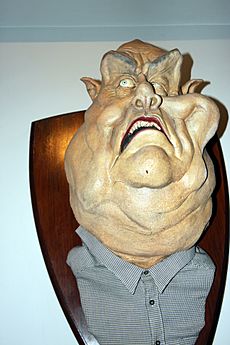
Muldoon was a figure who caused strong feelings, both positive and negative. He was known for being informal and direct. He built his reputation as a tough politician. He was the first Prime Minister to use television widely to gain support. He often used it to challenge his opponents.
When he became Prime Minister, Muldoon famously said he hoped to leave New Zealand "no worse off than I found it." Some historians argue that his policies were not sustainable in the long run. They believe his approach led to the later economic reforms.
Muldoon's style of avoiding intellectual discussions and instead challenging "elites" has been compared to later leaders like Donald Trump. Both Muldoon and Trump used populist methods. They aimed to create jobs and make their countries self-sufficient. They also had strong, direct personal styles.
Images for kids
-
Robert Muldoon and US President Jimmy Carter during an official visit to the United States, 1977
-
Muldoon meets British Conservative Party leader Margaret Thatcher, Wellington, September 1976
-
Prime Minister Muldoon (far left) and Governor-General Sir Keith Holyoake (third from left) with West German President Walter Scheel (fourth from right), pictured in the conservatory at Government House Wellington in October 1978
-
Cabinet photograph during Queen Elizabeth II's tour of New Zealand in October 1981; Muldoon is seated on the Queen's right
-
Muldoon on an unusual trip to Disneyland, in November 1977. Despite his serious personality, the Prime Minister was known for his quirky behaviour.
-
Muldoon and Australian Prime Minister Malcolm Fraser, meeting in 1978 in Sydney. The two leaders did not get along well.
-
Caricature of Muldoon in Backbenchers bar in Wellington
See also
 In Spanish: Robert Muldoon para niños
In Spanish: Robert Muldoon para niños
- Electoral history of Robert Muldoon
 | William M. Jackson |
 | Juan E. Gilbert |
 | Neil deGrasse Tyson |


